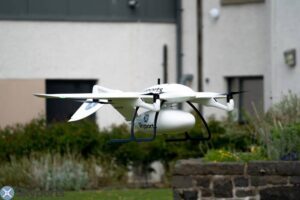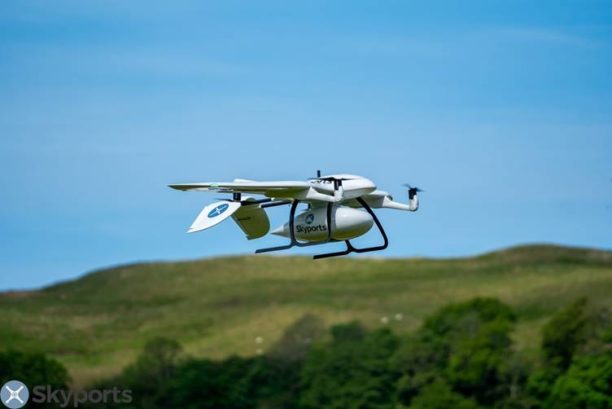
The project is supported by a joint funding initiative between the UK Space Agency (UKSA) and the European Space Agency (ESA) to support COVID response.
“In the coming months, Skyports will start delivering pathology samples, medicine, essential personal protective equipment (PPE) and COVID-19 testing kits between hospitals and to and from medical practices in Argyll and Bute on the west coast of Scotland,” says the company release. “Through Skyports’ technology, pick-ups that currently take up to 48 hours to be transported between healthcare sites will take only 30 minutes and with a much higher frequency.”
The project has been several months in the making. Skyports first started trials of NHS Scotland drone delivery services in May. Skyports hopes that the drone delivery operations will be integrated into the local NHS supply chain and “scaled for permanent operations,” says the press release.
The three way partnership between experts provides a robust and respected solution for the the project.
Duncan Walker, Chief Executive Officer at Skyports, said: “Using drone deliveries within supply chains can create significant time and cost savings. This project is a natural progression from our recent trials with the NHS in Scotland as we scale and develop our operations, supporting a wider network of hospitals and medical practices as they continue to respond to the COVID-19 pandemic.
“We want more healthcare facilities to benefit from our service over the long-term and the experience of this important initiative will put us another step closer to permanent operations that the whole of the NHS could soon benefit from.”
Anne Sheehan, Director, Vodafone Business UK, said: “There will be huge benefits from the use of drones connected to the mobile network that can be flown safely and securely beyond line of sight. This is a brilliant example of how using connected drones can radically change the way things are done, and really change people’s lives.”
Scott Campbell, partner and leader in Deloitte Ventures, said:“Drones have the potential to revolutionise the delivery of urgent goods and services for remote locations. Hard-to-reach communities in Argyll and Bute will benefit from drones as an alternative to land or sea transportation. This project is a powerful example of the value that drones could bring to communities and wider society in the coming years, as businesses collaborate to further develop the technology.”
Miriam McNabb is the Editor-in-Chief of DRONELIFE and CEO of JobForDrones, a professional drone services marketplace, and a fascinated observer of the emerging drone industry and the regulatory environment for drones. Miriam has penned over 3,000 articles focused on the commercial drone space and is an international speaker and recognized figure in the industry. Miriam has a degree from the University of Chicago and over 20 years of experience in high tech sales and marketing for new technologies.
For drone industry consulting or writing, Email Miriam.
TWITTER:@spaldingbarker
Subscribe to DroneLife here.
